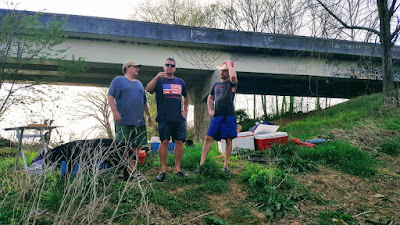She thinks it's funny.
There is less talk of "northers" these days. People sit softly at ten fifteen in the evening and watch while a bacon vender points to highs and lows and fronts on a chart, and then they go to the wall to twirl their thermostats, and perhaps the windows rattle a little in the night, but that's about all....In the country, though, a front is a fact still. There it's a blue line along the horizon, and a waiting, sweaty hush, and a hit like a moving wall, and all of life scurrying for the southern lee of things. There it's a battening down, an opening of hydrant valves, a checking of young and valuable stock, a walking across the swept lots with a flashlight, a leaning against the hard-shoving cold, a shuddering and creaking of old, tall, frame houses. Therefore I had little doubt about the exhilaration that lumped in my chest while I watched the cranes and the geese.
The women affirmed what the cranes and geese had told me; the television said that weather was on the way. They hadn't paid much mind to how bad it was to be, or when it was to hit. In the end, I had to argue out of an invitation to lunch two hours thence, when McKee would have returned; I said I had to get on down the river. It was true; if weather was to come, I wanted to be set for it.
Near the Oakes crossing, the sky seemed about to clear, then did not. the wind veered about from the east, and then back from the south, while the north side of me itched in expectation of that thrust which did not come. Finally it did come, or seemed to, a cool push from the northeast behind me as I tooled down into the long ingoing stretch of the Village Bend on smooth-flowing water over shallow sand and gravel. Then it stopped, and the air was hot again. I gave up weather prognostication.
I paddled on down a mile and, having time, picked a good campsite on a Berumda flat ten or twelve feet above the water with a wide, clean, sand beach below it and brush sheltering it behind, on the north. Goats had cropped the grass like a lawn and had done the passenger the favor of eating up all the burrs, which the perversely like. Good solid driftwood was lodged among the brush from the spring floods. I pitched the tent tail-north, the stakes solid in good turf, dug a pit for the fire before it, and, liking the looks of the whole business, decided I'd stay there until the norther had come and blown and show the length of its teeth. I could hold out, there. Except it didn't come.
Prognosticating despite myself, I decided that the cold front must have slowed to a stop somewhere to the north, so I loaded up early in the afternoon and pushed on under a blue sky pierced high by yellow thunderheads. But back on the river, swirling high currents swept the thunderheads out of the sky like minor actors exiting before the stars show up onstage. For thirty minutes a hot hush hung...
Finally, from the northwest, an arched crescent of blue-dun cloud, sky-wide, rolled hugely high and fast down at us, the atmosphere clear before it and clear behind. Not having prognosticated worth a damn, I scuttled for the flatter shore and had the tent up lopsided but solid under a half-dead elm by the time the first big slam of cold hit, with a sweep of leaves and sand and the fresh uplift of body and spirit, probably barometric, that they always carry even when you don't want them.
From the southeast, rearing to meet the blue-dun cloud's charge, a white roll of exactly similar shape moved up. In the dusk, when I'd finished setting up and was squatting in the tent opening by a good fire, they met with thunder and the last red tints of sundown flame-edged their fight. Big drops of rain spatted down diagonally through the violent air, and the old elm in the fire hissed and spewed and stank and radiated, lightning took over the sun's work and made the early night for a time flickeringly white, and loud with thunder.
I baked a slab of biscuit bread, dry and toast-tasting, beside the fire, ate it with thick slices of broiled bacon, and went to bed. The rain thickened, then slacked, then came down again in floods; the night crackled and roared with change and iron cold. Drunk with coziness, the pup wallowed beside me and groaned, and I remember wondering, before I slept, a little more about the relation of storms to man.... If, being animal, we ring like guitar strings to nature's furies, what hope can there be for our ultimate, planned peacefulness?
But night questions don't have answers.
Goodbye to a River, pp. 108-110.



1 comment:
https://waterwatch.usgs.gov/wwapps/ww_chart.php?i=nwis&vt=uv&ot=q&site_no=03604000
Post a Comment